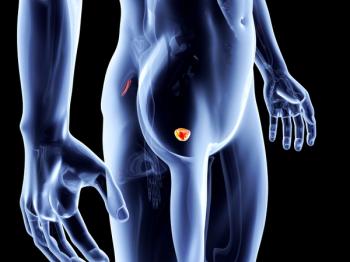
The Link Between Apalutamide and QOL in Non-Metastatic CRPC
New research in Lancet Oncology confirms previous studies in this population on the addition of apalutamide to androgen deprivation therapy.
Adding apalutamide to androgen deprivation therapy (ADT) does not appear to harm health-related quality of life (HRQOL) in men with nonmetastatic castration-resistant prostate cancer (CRPC), according to new research
Previous research has showed that men in this patient population who received apalutamide had longer metastasis-free survival and a longer time to symptomatic progression compared with those who received placebo. This new study found that adding apalutamide still preserves HRQOL. Specifically, the group mean patient-reported outcome scores over time demonstrated HRQOL was maintained from baseline (initiation of apalutamide), and it was similar over time among men receiving apalutamide versus placebo.
“Great news for patients,” said lead study author Fred Saad, MD, who is a professor and chief of urology as well as director of genitourinary oncology at the University of Montreal Hospital Center in Montreal. “Patients were asymptomatic, and the quality life data showed that, although they received effective treatment, they did not have any negative impact on their quality of life, which is very reassuring.”
The SPARTAN trial previously demonstrated that, when compared with placebo plus ADT, apalutamide plus ADT significantly improved metastasis-free survival in men with nonmetastatic CRPC who were at high risk for metastases. For this current investigation, Saad et al examined the effects of apalutamide vs placebo on HRQOL.
The researchers randomly assigned 1,207 men to receive apalutamide (N=806) or placebo (N=401). All participants were assessed for HRQOL using the Functional Assessment of Cancer Therapy-Prostate (FACT-P) and EQ-5D-3L questionnaires.
Treatment was completed between October 2013 and December 2016, and the median follow-up for overall survival (OS) was 20.3 months. In the apalutamide group, the FACT-P total and subscale scores were associated with a preservation of HRQOL from baseline to cycle 29. The results were similar for EQ-5D-3L. Overall, HRQOL was maintained from baseline after initiation of apalutamide treatment and was similar over time among men receiving apalutamide vs placebo. In addition, there was a slight signal that HRQOL deterioration may have been more common in the placebo group.
“We felt the treatment would be well-tolerated, but that no negative impact on QOL was seen. Even some impression of [a] better quality of life was reassuring and even a little surprising,” Saad told Cancer Network.
Apalutamide (Erleada) is a nonsteroidal antiandrogen medication that was approved by the US Food and Drug Administration (FDA) this past February. It was the first drug to be approved by the FDA based on an improvement seen in metastasis-free survival. Historically, these types of approvals were based on an improvement in progression-free survival or overall survival.
Tom Beer, MD, who is a professor of medicine in the Division of Hematology/Medical Oncology at the OHSU Knight Cancer Institute in Portland, told Cancer Network that these results are gratifying.
“As a hormonal agent that more completely blocks androgen receptor activity, apalutamide adds some adverse effects to the primary hormonal therapy, but these adverse effects appear not to substantially degrade quality of life and are counterbalanced by the benefits of delaying metastatic progression.” Beer said. “One note of caution is that these analyses are aggregate for the entire population, and individual patient experiences can and do vary.”
Newsletter
Stay up to date on recent advances in the multidisciplinary approach to cancer.
















































